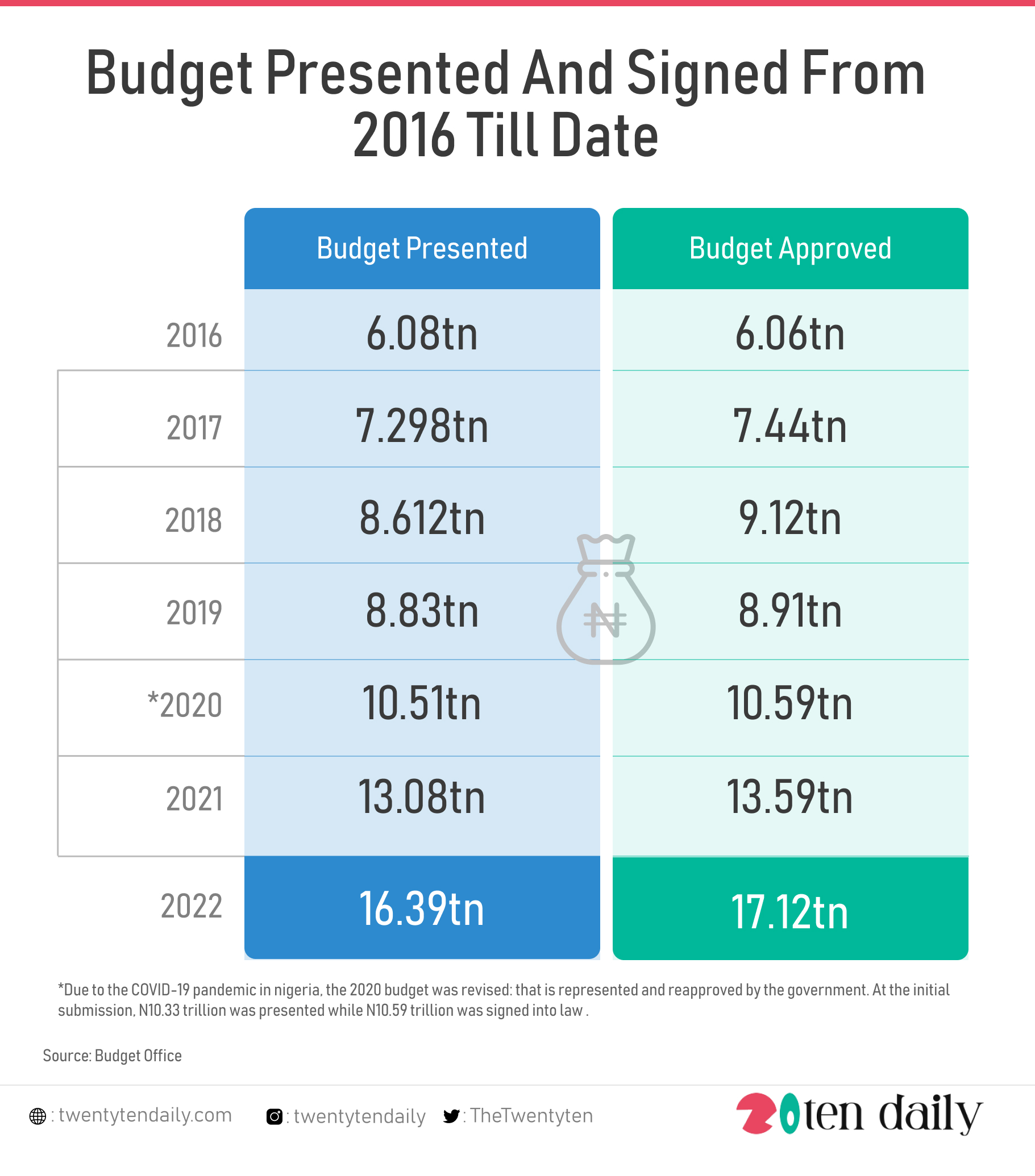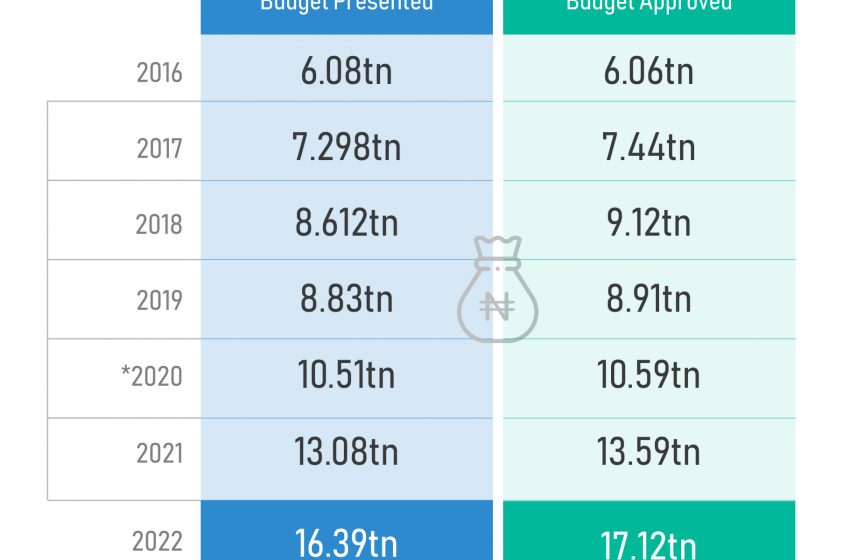Between 2017 and 2022, the Nigerian National Assembly had increased the budget expenditure by a total of N1.915 trillion.
While several controversies– including budget padding, repetition of projects, unnecessary allocation of funds– trail these increases yearly, the legislators have increased the budget by an approximate average of 0.31 billion yearly.
Despite this increase, NASS, in line with President Muhammad Buhari’s agenda to always send the bill of the preceding year on time, has maintained to always pass the bill for approval before the appropriation year begins.
In President Buhari’s seven-year tenure, only the 2016 budget has been reduced from the initial amount sent by the president. In 2016, the president sent an appropriation bill of N6.08 trillion and later approved N6.06 trillion.
Constitutional Provisions
According to sections 81 and 121 of the Constitution of the Federal Republic of Nigeria 1999 (CFRN, 1999), the President
shall cause to be prepared and laid before each House of the National Assembly (NASS) at any time in each financial year estimates of the revenues and expenditure of the federation for the next financial year while the Governor performs about the same functions at the state and submits to the State House of Assembly.
After the presentation is made, finance committees at the various appropriation committees (Finance Committee, Budget Committee and the NationalPlanning Committee) would be formed to scrutinize the bill, alongside plenary sessions for the hearing and passage of the bill.
The scrutiny avails the legislators the opportunity to manage the budget estimate with Nigeria’s economy and also ensure that the needs of the people are prioritized.
It is within the powers of the assembly, after debating the proposed amount allocated to projects, MDAs, etc, to increase or reduce the allocation as it deem fit.
Budget Presentation And Approval
After his assumption as president in 2015, Buhari presented his first N6.08 trillion budget for the fiscal year 2016. This was the first time a president would present a budget to the National Assembly in three years.
In the budget, capital expenditure takes N1.8 trillion, marking a significant over 300 percent increase from the 2015 vote of N557 billion.
In May, the president signed the record 6.06 trillion budget, which was expected to stimulate the nation’s slowing economy which took a hit as the price of crude oil, Nigeria’s main export, collapsed in the global market.
By December, Buhari presented a 7.928 appropriation bill for 2017 to the assembly. The budget was themed “Budget of economic recovery and growth”. The President described the 2017 budget as one focused on aggressively steering the economy from the current recession.

By September, the president directed his vice, Yemi Osinbajo, to sign the bill into law. The signing of the record 7.44 trillion naira ($23 billion) budget came in the absence of Buhari who was on medical leave in the United Kingdom.
In November, Buhari presented to a joint session of the National Assembly a budget estimate of N8.612 trillion for the 2018 fiscal year.
The key parameters and assumptions for the 2018 budget with a deficit of N2.005 trillion as presented include an oil benchmark of $45 per barrel, oil production estimate of 2.3 million barrels per day, the exchange rate of N305/$ for 2018, real Gross Domestic Product (GDP) growth of 3.5 percent and an inflation rate of 12.4 percent.
Seven months later, he signed the budget, which was jacked up to N9.12 trillion into law.
In December, Buhari presented N8.83tn budget estimates to a joint session of the National Assembly for their consideration. The 2019 national budget proposal is N300bn lesser than the N9.12tn, which was the size of the 2018 budget.
However, in May, Buhari signed the 2019 appropriations bill into law with an increase of N90 billion by the national assembly.
In October, Buhari sent a 10.33 trillion naira budget to the assembly. The budget seeks to achieve a 7 percent increase in the Federal Government revenue from the estimated revenue for the 2019 fiscal year while the Finance Bill proposes an increase in value-added tax rate from 5 percent to 7.5 percent. In December, the president signed the 2020 Appropriation Bill into law. The National Assembly had passed the N10.59 trillion.
At the outbreak of the COVID-19 pandemic, Buhari submitted a revised 2020 budget of 10.51 trillion naira ($29.19 billion) to Parliament for approval. The coronavirus pandemic and an oil price plunge have magnified headwinds in Africa’s biggest economy, which relies heavily on crude sales for government revenues. In June, he signed the 10.8 trillion revised budget into law.
In October 2020, the president presented the sum of N13.08 trillion as the proposed 2021 Budget estimates to the Assembly. He noted that the 2021 budget is an opportunity to consolidate the gains of the 2020 budget. He added that the implementation of the 2020 budget was impacted by the outbreak of the novel coronavirus (COVID19). Buhari signed the 2021 Appropriation Bill into law in December 2020. The revised budgeted expenditure is N13.59 trillion, 4 percent (N505 billion) higher than the N13.08 trillion budgeted expenditure. In July, the President also signed the 2021 supplementary budget of N982.7 billion into law.
2022 Budget Approval
Buhari presented, in October, the 2022 Appropriation bill tagged a “Budget of Economic Growth and Sustainability.” It was estimated at ₦16.39trillion.
The president said that the bill was designed “to build on the achievements of previous budgets and to deliver on our goals and aspirations as will be reflected in our soon-to-be-launched National Development Plan of 2021 to 2025.”
While presenting he said, “Defence and internal security will continue to be our top priority. We remain firmly committed to the security of life, property and investment nationwide.
“We will continue to ensure that our gallant men and women in the armed forces, police and paramilitary units are properly equipped, remunerated and well-motivated.
“The 2022 budget is also the first in our history, where MDAs were clearly advised on gender-responsive budgeting. These are part of critical steps in our efforts to distribute resources fairly and reach vulnerable groups of our society.”
After over two months of sending the bill, the Senate passed an aggregate expenditure of N17,126,873,917,692 trillion naira as the budget for the 2022 fiscal year.
The legislators increased the 2022 appropriations from N16,391,023,917,692 to N17,126,873,917,692.
Buhari, however, signed the bill into law with over 700 billion added.

